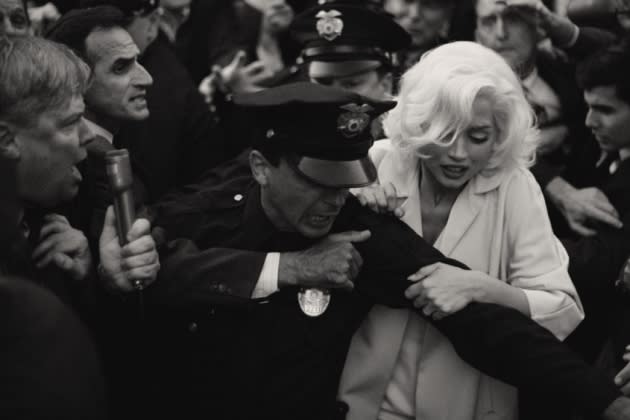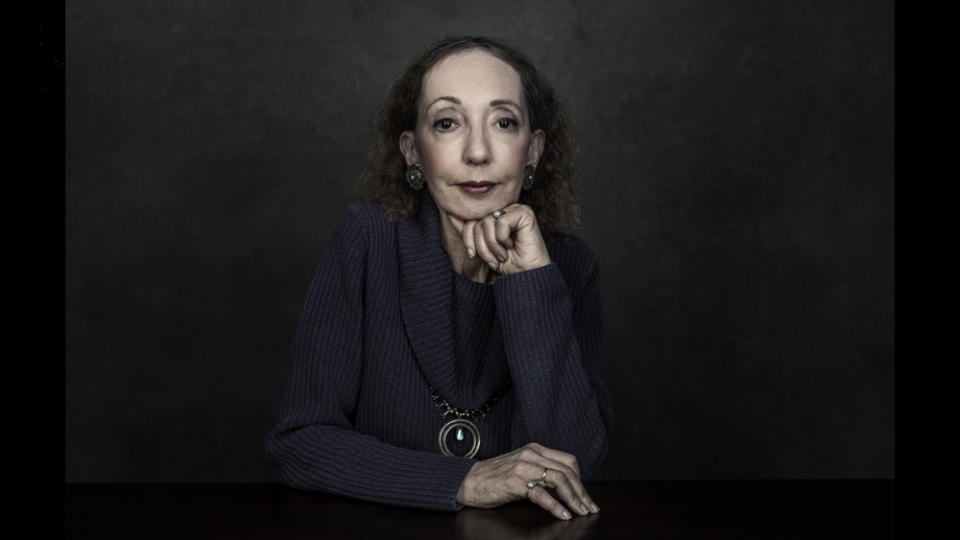‘Blonde’ Author Joyce Carol Oates Gives Two Thumbs Up to Andrew Dominik’s Movie Adaptation, Starring Ana de Armas
- Oops!Something went wrong.Please try again later.
- Oops!Something went wrong.Please try again later.

On Sept. 23, the long-awaited Andrew Dominik-directed adaptation of Joyce Carol Oates’ bestseller “Blonde,” about the desperate life of Norma Jeane Baker, performing as Marilyn Monroe, will be released on Netflix, and it is likely to world premiere before that at the Venice Film Festival. Oates has already seen the film and approves of it, she revealed during a discussion at the 21st Neuchâtel Intl. Fantastic Film Festival in Switzerland.
“Andrew Dominik is a very brilliant director. I think he succeeded in showing the experience of Norma Jeane Baker from her perspective, rather than see it from the outside, the male gaze looking at a woman. He immersed himself in her perspective,” Oates said.
More from Variety
Neuchatel Fantastic Film Festival Blurs Borders for Expansive 21st Edition
'Blonde' Trailer: Ana de Armas Stuns as Marilyn Monroe in Netflix's NC-17 Drama
Ana de Armas' 'Blonde' Director 'Surprised' by NC-17 Rating: Film Will Likely 'Offend Everyone'
In her novel, published in 2000, Oates explored the phenomenon of a vulnerable Norma Jeane Baker losing her own identity to that of Marilyn Monroe, a completely made-up identity, by becoming a product exploited by the movie industry. “She gained a fame in the world, but that’s not an identity you can live with. It is one that made a lot of money for a lot of men, but not much for herself. When she died, at 36, she didn’t own enough money for a proper funeral,” Oates said.
The teaser of “Blonde” shows Norma Jeane Baker being worked on by her make-up artist, waiting for Marilyn Monroe to arrive in her mirror, and scared that she might not come. “Transforming into Marilyn always took her hours,” Oates said. “Ana de Armas, the wonderful actress who plays her, I think it took her like four hours of make-up. So when you see them on screen, they don’t really exist. It’s like a fantastic image, but to make it a livelihood is to endure a good deal of anguish. As Marilyn got older, she was still being given these roles a young starlet would play, and she was feeling humiliated. You can’t keep playing this dumb blonde nearing the age of 40. Some people say she committed suicide. I don’t necessarily think that. I think she may have died of something like extreme despair.”

Courtesy of Dustin Cohen
Oates, who was at the festival to serve as president of the international jury, has written more than 150 novels and stories in a career spanning more than 60 years. She is a multi-finalist for the Pulitzer Prize, five times winner of the Bram Stoker prize, and has established herself as a ruthless observer of American society. She is very active on Twitter, with more than 136,000 tweets, and is a fierce opponent of Donald Trump.
Next month, her new work “Babysitter,” based on a serial killer who lived in the Detroit area when she lived there, will hit the shelves. The novel explores the feelings of fear and anxiety felt right in the middle of the experience, not when looking back at it. “I wanted to chart the emotions and how people cope and relate to one another during the duration of time in which there is a state of suspended anxiety before you come to the end of something.”
At NIFFF, the prolific writer gave an insight into her working method. At 84, she still teaches creative writing at Princeton University. “Before starting to really write, think, daydream, meditate, take long walks alone to think about what you will work on,” she advised.
She herself starts writing every day in the early morning, after running or walking for an hour. “When I’m running, I think about the scenes that are unfolding, I imagine the interactions. You can build the whole novel that way before writing anything.”
Another piece of advice she gives her students, is to start with short texts. “Every time you finish a text that you know is good, you have a feeling of happiness, a sense of completing. A novel can be a burden because years and years can go by before you finish it and somehow that can drag you down. Many writers have a melancholia and a propensity toward depression, so you have to be aware of that.”
She told Variety about her sadness at having so many stories untold she fears she will never be able to write them down. “Like most writers, I have folders and drawers filled with outlines, sketches and thousands of pages of notes. I have novels which seem so promising to me, all plotted out in great detail, but I don’t have the time to write them. I can only work on one at a time. I have much more work to write than I will ever live to write and that makes me feel bad.”
Noting that this was her first trip to Switzerland, she said: “I’m just impressed and delighted to be in Switzerland, first of all because it’s a civilized country, and that’s sort of startling and original for someone who lives in the U.S., especially since 2016 with these vicious campaigns for Presidency, and our whole society has been very deeply polarized,” Oates said.
“Since 2016 it’s been very evident that there are two Americas, so the overturning of Roe vs. Wade by the Supreme Court in June was not at all surprising,” she told Variety. “America has been very puritanical and very punitive toward women. There’s history in the 18th and 19th century of viewing women as second-class citizens and not fully human. There has always been a bias against women so passing laws to control them is very natural in the United States. But some thought that we had gotten beyond that since the 1960s, that we were more educated, but we have a complex situation in the country, where a minority of people who are Evangelical Christians have a disproportionate power.”
She said this aging minority is on the decline, which is why it has been so belligerent lately. Oates is very optimistic about the younger generation: “There’s a good deal of bigotry in the United States in some quarters against liberals, black people, women, immigrants, transgender, gay and lesbian people, a large group that’s feared by the white minority of Christian Evangelicals. That’s why I feel optimistic about the future: there will be more immigrants and there will be more children born to educated people, more education. Education is the key! So ultimately, I think the majority will get stronger, and that it will swing toward more liberal politics again. This will happen in the upcoming decades, maybe 20 years or so.”
The Catholic-turned-atheist author was equally forthright when asked about religion: it only interests the naturally skeptical writer as a psychological and historical phenomenon. “As I got older, it seemed to me that organized religion is a way of controlling people’s minds and manipulate them so that they may accept something about reality that should not be accepted.”
In “A Book of American Martyrs,” published in 2017, Oates, herself pro-choice, skillfully tackled the theme of abortion, and unraveled the opposing points of view of anti-abortion evangelical Luther Dunphy and the abortion doctor Augustus Voorhees, respectively the assassin and his victim, as well as those of their daughters. To put herself so brilliantly in the skin of her characters is one of the many talents of the upstate New York-born author.
“There is no difference between writing from the perspective of a man or a woman, a child or an older person,” she tells Variety. “The challenge for the writer is to find a language that is original enough to be of interest to the writer. The challenge for the artist is to challenge oneself, so I have to find a specific language for each novel that is different. The language is the challenge.”
In interviews, Oates often described herself as a person with no personality, saying she is “as transparent as a glass of water.” In her work, she explores the different perspectives and refuses to write from her own. “I am interested in holding a mirror up to the world, observing other people and exploring the interior of experiences. I don’t make judgements. I don’t care about putting my own shadow on things. I am more interested in reflecting the complexity of reality,” she said in Neuchâtel. “If there was a complex situation, I would like to explore all the facets of it rather than have just one perspective that’s my own.”
In the same way, there is no question of her ever writing the story of her life. “I don’t have a story,” she insisted. “We don’t have just one. One day or one hour in your life could be a whole story. I never really felt that I wanted to write about myself. I am much more interested in others.”
Best of Variety
Sign up for Variety’s Newsletter. For the latest news, follow us on Facebook, Twitter, and Instagram.

